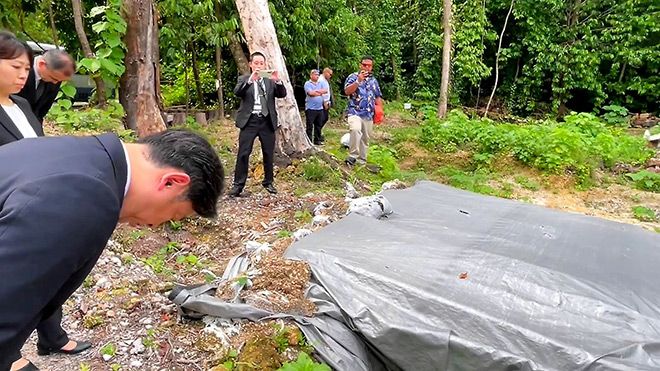Welfare minister Takamaro Fukuoka and his subordinates visit Peleliu island in Palau and pay their respects to the war dead buried at various locations. (Video footage by Natsumi Adachi)
PELELIU, Palau—Japan and Palau will undertake one of the largest recoveries of remains of Japanese soldiers killed during World War II.
Welfare minister Takamaro Fukuoka met with Ngiraibelas Tmetuchl, the Palau minister of human resources, tourism, culture and development, on May 5, and they agreed to cooperate in recovering the war-dead remains.
The island of Peleliu, located about 3,000 kilometers south of Japan, was the scene of heavy fighting from Sept. 15, 1944, between the Imperial Japanese Army and the U.S. Army.
Japan had trusteeship over Palau after Germany’s defeat in World War I and made the island nation a major military base.
The Battle of Peleliu over about two months left about 10,000 Japanese soldiers dead, while the U.S. side suffered casualties of between 1,600 and 1,700.
The Japanese government first sent a team to recover remains in 1953. So far, the remains of 7,800 soldiers have been collected.
A mass grave site where the U.S. military buried the Japanese war dead soon after the battle was discovered last year.
Welfare ministry officials examined declassified U.S. military documents, which showed that 1,086 Japanese soldiers had been buried in the mass grave.
That figure is close to half of the 2,400 or so soldiers whose remains have not been found in Palau.
The project would be the largest of its kind since 2010, when about 2,000 remains were uncovered on Iwoto island, previously known as Iwojima.
Under Palau law, the digging up of remains must be conducted with a Palau official observing the work.
Fukuoka said he received assurances that the Palau government would cooperate in providing witnesses for the recovery work.
After the discovery of the mass grave, the welfare ministry doubled the amount in the current fiscal year budget for recovering war-dead remains to 93 million yen ($650,000).
While the Palau project will likely bring closure to many Japanese families, there are still about 1.12 million Japanese war dead outside of Japan whose remains have not been dug up and brought back home.


AloJapan.com